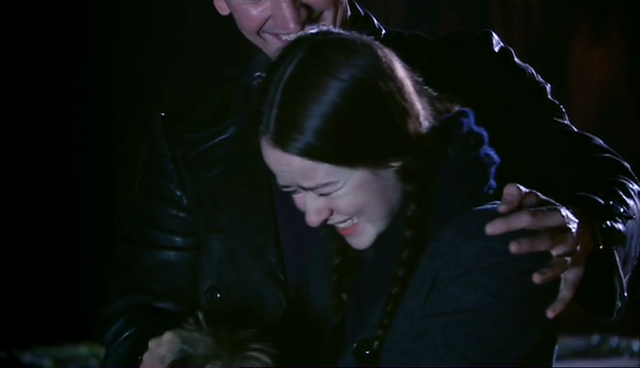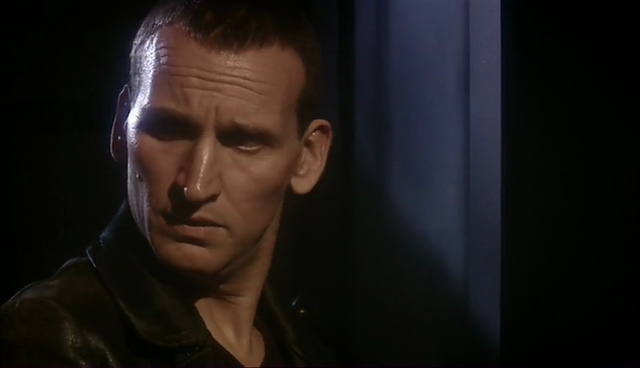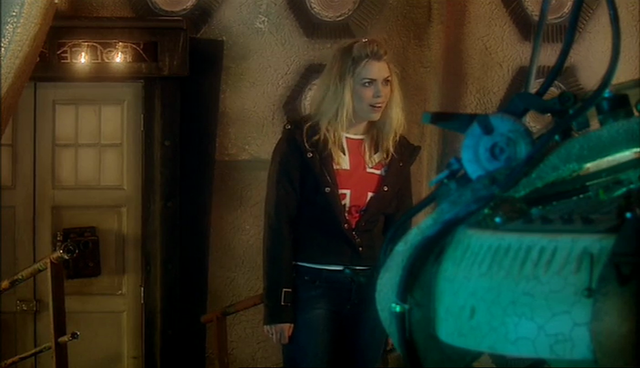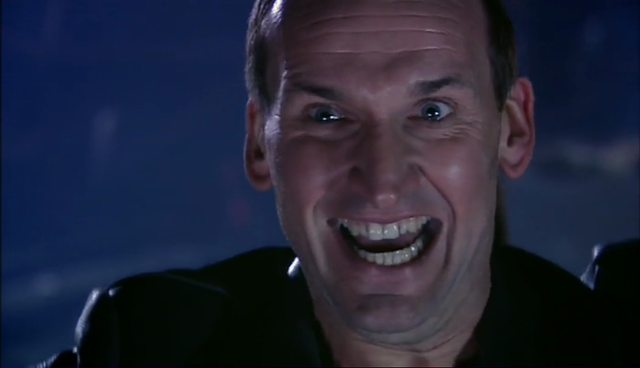The Doctor dances
– Look at you, beaming away like you're Father Christmas.
– Who says I'm not? Red bicycle when you were twelve?
– What?
Today we learn the secret of the Empty Child. Basically, The Doctor dances resolves the threads started previously, and does not introduce a lot of new things. Does that mean we have nothing to talk about today? Well, of course not!
Nancy again
Like in the previous episode, Nancy is one of the most important people here. Let’s start with a bit of trivia. Florence Hoath was 20 when she played Nancy, and it seems it was a perfect casting (and probably good makeup, too) – she really looked much younger. (And I can’t be the only one thinking that an episode where the Doctor visits her in, say, the 50s and she becomes a one-off companion would be absolutely fantastic!)
Last time I spent quite a lot of time discussing how it was wrong for her to break into houses and steal food, so let me not repeat myself and focus on other aspects of her portrayal. Morals aside, the way she blackmailed Mr Lloyd was really clever – and so sad at the same time. Remember how I praised Mrs Lloyd’s selfless love? Now this is what she was getting in return, an unfaithful husband. Well, this is the risk of loving someone – since true love is selfless, it may happen that you give but don’t get anything… It’s still worth it to love, of course, and people are loved back pretty often, but you’d better be aware that there is a possibility you won’t be…
However, I was supposed to talk about Nancy, right? Let’s start with her reaction when little Jamie obeys the Doctor and goes to his room. She first smiles (though with tears) and then breaks down and starts crying. It is actually the first hint to who she really is.
I also like the scene when she tells the homeless children that she has to go to the bomb site, and gives them her “last instructions”. This is a nice reminder of the role of a parent, who should teach life to their kids but then let them go and lead their own adult life. (Obviously, the children Nancy was caring for were anything but adults, but the lesson remains. And her saying explicitly that she might get killed was especially powerful. So many people try to pretend everybody is immortal and don’t even mention death…) And right before that, when she snaps at the little Jim who annoys everyone by typing loudly on the machine he’s found (by the way, do kids these days even know what a typing machine was? I’m old enough to have been using one many times…), and then apologizes – again, as a parent I can sympathize with this so much… It’s so easy to get angry because of some minor detail, and so hard to recognize that it’s your fault not to restrain your emotions a bit and apologize… High praise for Nancy here!
The next big moment for Nancy was when she talked with the nanogene-slash-zombie-infected soldier who was supposed to guard her. It was really heartbreaking to hear this: “Please, let me go. It’s too late for you. I’m sorry, but please let me go.” Admittedly, that wasn’t very nice to him – pointing out that he’ll be (well, sort of) dead in a moment – but I think Nancy can be fully excused. It’s not that she could help him anyway, and while the truth must have been very uncomfortable for that soldier, it was, well, the truth. This touches a very delicate question. If someone close to you is dying, should you tell them? Or should a doctor tell their patient the same thing? As with many yes-or-no questions, there are two schools of thought. My position is simple – people have the right to know that it is most probably the last moment they have to prepare for the end of their life. Many people fear death (which is natural, of course), and claim that they would prefer to die quickly, not knowing about it in advance. It’s like if a student, who procrastinates instead of studying for their exam, said that they didn’t even want to know when the exam is. We are all going to die anyway, so why not prepare for that? Ideally, that preparation should be done systematically, every day and every hour, but people are people, so knowing that it is now (or very soon) can really help. (Of course, hoping for being able to die consciously is one thing, but counting on that and knowingly living sinfully, intending to only repent shortly before death is one of the most grievous sins, and one of the most stupid things possible.)
Coming back to Nancy – I like to think that her singing a lullaby to the infected soldier was one of the many hints to the Doctor (and the smarter part of the audience) who she really was. Another one was when she corrected Jack (“Not the child. Jamie.”) Yet another one – very easy to miss – was when the heroes came into Jamie’s room, filled with his drawings. Every single one of them was a drawing of his mommy, but not a single one of them had a slightest hint of a sister… (To be clear – I’m not claiming superior intelligence here, I didn’t have a clue, the revelation that Nancy was Jamie’s mother was completely unexpected for me, and I found this observation in the depths of the Internet.)
The last thing I’d like to mention about Nancy was her last scene. It was truly touching, and for two reasons. One is her visible relief that she no longer has to hide her secret. Once the Doctor found out (and it was only then when he finally added two and two together and all the previous hints apparently connected in his mind) and told her that he knew, she didn’t have to care for keeping the appearance of being Jamie’s big sister anymore. And in the same moment we saw how she must have wanted to embrace Jamie. She avoided it all the time because of fear (and she had every right to behave like that!), and we saw how taxing it was for her. Now that she realized that (for all she knew) she – and everyone – was doomed anyway, she finally answered the Empty Child’s queston and gave him a proper hug.
Now, here are my final thoughts about Nancy’s and Jamie’s sweet ending. Let us ask a similar question to the one we discussed when analyzing Father’s Day. Knowing what touching Jamie does to people, does that mean that she (to the best of her knowledge) committed suicide? I’d say technically yes, but given how she must have been convinced about the inevitability of her death at that point and her psychical exhaustion, I wouldn’t dare to blame her for that. But here is another, more important thing. (Note: I might really be stretching things now, I’m not even 100% sure I’m right. But bear with me.) The Doctor – clearly knowing more than her about the whole conundrum – told her that she should tell Jamie the truth. Well, you might say, to tell the truth is one thing, but to hug him – knowing how infectious his condition is – is another. Here is one possible reply to that. “I am your mommy” is basically synonymous to “I love you”, and true love affects your whole person – soul, mind, emotions, body, everything. If you truly love someone, you have to express it with your body, although how you do that depends on the situation and the kind of love we’re talking about. Love of a mother has its own ways, love of a friend has other ways (sadly, in our culture it’s often restrained to just a pat on the back), love of a spouse has (of course) its own ways, and – last but not least – love of God also has its own ways (if you’ve ever been to a Catholic Mass, you know that people there are hardly static!). So, assuming that Nancy truly loved Jamie (and we are fully entitled to believe so – rememer that true love does not necessarily mean ideal or perfect love, so be so kind and shut up about any of her possible faults), she had every right to treat the Doctor’s request to tell Jamie the truth as a request to also take his hand, hug him, kiss him – whatever it takes to express her motherly love. Good thing that this was exactly what was needed to save the day!

Genuine tears of joy. Give me a day like this!
The Doctor or Jack?
Enough about Nancy – let’s talk the second most important topic of this episode. It’s actually kind of an overarching theme of Series 1 and the whole story of Rose Tyler. Time and time again, she has to choose between the Doctor and someone else, be it Mickey (in Rose), Adam (in The long game), Pete (in The long game), soon spoiler for series 1Mickey again (in Boom town), and much later spoiler for series 2between her reunited family and the Doctor. I admit that in this particular episode it’s rather heavy-handed, but it’s still important – though I have already mentioned this topic previously, so I’ll make it short here.
Rose was clearly quite infatuated with Jack from the very start, and in this episode the time has come for her to become (once again) disillusioned. Probably the first moment she started to see through Jack was when he laughed about his Pompeii joke. It’s long been a cliché to say that one of the defining characteristics of Rose is her compassion; making jokes about tragic demise of the whole city’s population in front of her is definitely not the best way to win her affection. After Jack’s failed attempt at humor Rose just gave him a distasteful look and followed the Doctor.
The second moment was when he complained about the “special features” of his squareness gun – notably, how they “drained the battery”. They are awesome – you have to admit that making holes in walls and then immediately fixing them is cool and practical at the same time – but they are not reliable. The Doctor’s sonic is way less impressive in comparison to Jack’s gun, but works all the time (well, most of the time – and now the question that bugs me is whether the sonic blaster works on wood…). Interestingly, even the Doctor himself lost his confidence for a short while (“It's sonic, okay? Let's leave it at that”), but it didn’t take long for him to regain it.
On the other hand, when Rose quips that “[…] he's vanished into thin air. Why is it always the great looking ones who do that?”, she seems to admit to herself (and the Doctor) that “all that glitters is not gold”, and while Jack is handsome and cool, he has just left them in a trap. (Of course, it turned out that he did not abandon them in the end, and Rose apparently did regain trust that he’d not do that – but it was only after he om-commed them.) It’s a nice touch, by the way, that Rose and the Doctor returned (pun intended) that exact favor and came back for Jack at the very end.
On yet another hand, when Rose complains that what she and the Doctor were doing “didn't feel like dancing”, it seems that what she aims to do is to make the Doctor at least slightly jealous of Jack and nudge him to learn to dance. I think this is actually a pretty good way to cope with a feeling of jealousy. Let us stop for a moment, because this is actually an interesting issue. For the sake of example, imagine that I meet a girl who does something – let’s say, dances – better than my wife (and for the record: when I say “dance” here, I mean “dance”, literally, nothing else – and the example is purely hypothetical anyway, since in reality, I’m not very fond of dancing). I may feel jealousy, which is neither good or wrong morally unless I act on that feeling. I could, on the other hand, dance with that girl (imagine that it happened at some party), neglecting my wife – which could be stepping on a slippery slope and would almost certainly be a bad thing to do. I could also mention the fact (and my feelings about it) to my wife in the hope that she’d put some effort to get better at dancing – a much better decision (and possibly much better outcome), and more or less what Rose did here. I could also decide that dancing is not the most important thing in my life and that I have other reasons to spend time with my wife and not anyone else. The last option seems the morally best one at a first glance, but I’m not entirely convinced. It looks the most “pure”, true, but in fact it sidesteps the problem (even if it’s a minor one) instead of solving it. What’s more, it prevents my wife from becoming, well, a better wife. It appears to me, then, that what Rose did was actually close to the best course of action. (Of course, she could make it even better if she spoke to him later, in private, and not in such a sarcastic way.)
And let us finish the section about Jack with a mention to the face the Doctor made when Jack decided to “block out the [Empty Child’s] signal” with the Glenn Miller song. His expression was absolutely priceless!

What do you mean, “our song”?
Other tidbits
As usual, let me now mention a few smaller highlights of the episode without any further analysis.
I quite like the fact that after the Doctor scolded the gas mask creatures and ordered them to “go to their room”, the first thing Rose did was to sit at the bed of one of them. As always she was the most compassionate. And not long after that she also proved that she was clever, too – pointing Jack’s gun at the floor to escape was brilliant.
During the typewriter scene in the house I mentioned when discussing Nancy there is this wonderful piece of dialog between the two boys:
– You can’t even read or write.
– I don’t need to. I’ve got a machine.
During the A.I. craze of this year (for future readers: I’m writing this in late 2023), I feel that this exchange acquired a completely new, pretty ironic meaning…
Jack complaining about the Doctor being the cause of the explosion in the Villengard weapon factory met a quick-witted reply from Rose: “First day I met him, he blew my job up! That’s practically how he communicates”. This is something to point out to everyone claiming Rose not to be very intelligent, people. (And I say that even though Rose is definitely not my favorite companion!)
If you hoped for at least a short discussion about how the Doctor explained to Rose how the human race is going to “seek new life and… dance” in the 51st century – well, here you are. I would prefer to pretend that that conversation never happened and refuse to talk about it. It is in fact one of the weakest moments of this episode. Granted, it ties in with Cassandra complaining about the human race “mingling”, but it still felt off to me.
Nancy asking Rose if she weren’t German was yet another underrated moment. It is very easy to overlook the fact that Nancy’s trauma was caused not only by losing her own child (and blaming herself for that), but also by seeming to have lost her country. Rose was right that her telling Nancy that Germany was about to lose the war was not exactly something a time traveler should do, but she still thought it was better to tell her, and I agree.
The Doctor’s love for absolutely terrible puns strikes again in this episode when he calls doctor Constantine a “constant doctor”. Even I – a hopeless pun addict – gritted my teeth and groaned when I heard that. In other words, I loved it!
Speaking of Doctor Constantine, him asking one of the cured patients if it was possible that she miscounted her legs due to the confusion caused by the war is British humor at its best.
Yet another moment which seems criminally underrated is the Doctor basically telling Rose that he went back in time some 7-8 years to give her a red bicycle for Christmas. When I first heard that, I thought it was extremely cute and literally cheered.

– Red bicycle when you were twelve?
– What?
On the completely other hand, the Doctor’s “definition” of life (“What's life? Life's easy. A quirk of matter. Nature's way of keeping meat fresh. Nothing to a nanogene.”) was a very strange thing for him to say. We know that Doctor is very protective of life in all its forms – a topic we are going to return to many times if I manage to write on this weblog longer than for the next few weeks. spoiler for series 6Eleven even used the phrase “sacred life” once, which is also strange for him given his usual irreverence. Dismissing life as a “quirk” and a “way to keep meat fresh” looks like a not-very-well-thought-out insert from Steven Moffat (or was it Russel T. Davies who suggested that? no idea). Given the Doctor’s happiness about the overall result of the whole adventure (we’ll get to it in a moment), why didn’t he investigate th Chula culture and their nanogenes in more depth so that he could revive dead people in the future? Don’t get me wrong, The Doctor dances is a very strong episode, but I consider it my duty to point out a seeming inconsistency here. (Not that an inconsistency is a rare thing in Doctor Who.)
I also laughed hard when Jack told his computer “Lovely. Thanks. Good to know the numbers” when informed about his imminent death. It immediately reminded me of another space jerk-turned-hero who got a similar comment (though his chances were actually much better) from a machine once, and famously replied “never tell me the odds!”. I’m almost sure this was an intentional reference, despite how often this episode refers to the other franchise. And of course the Doctor telling Jack to close the door, because the explosion of his ship is going to cause a draught is again one of the highlights of Nine’s dry sense of humor.
Last but not least

Just this once, everybody lives!
Unlike some other moments I mentioned in the previous section, the Doctor yelling “Everybody lives” is not underrated – it is in fact one of the most iconic moments of the whole series. I don’t think it’s overrated, either. His joy is funny, adorable and infectious, all at the same time. And yes, technically he’s wrong – German bombs are still falling all over London and people are dying all the time, but that’s not the point here. The point is that nobody dies because of the events he was directly involved in. It is good to understand and accept that we cannot fix the whole world, and we should focus on fixing some small part of it we can actually influence. (Of course, concentrating also on expanding the part we can influence is not a bad thing, either.) Ah, and one more thing – it is very easy to miss (in fact, I missed that completely), but the “everybody lives” line also shows the progress of the Ninth Doctor as the character – eight episodes ago he said that “everything has its time and everything dies” and did nothing to save Cassandra (well, she was a criminal, but still). It is quite possible that if this adventure happened then, the Doctor would just apathetically comment how Jack was the cause of his own demise and did nothing to save him. spoiler for series 1Too bad he’s going to fall back to his old ways very soon…